CENTRAL CUBA EAST
From the atmospheric colonial city of Trinidad to the gorgeous beaches of the Jardines del Rey, this region is one of the most exciting in Cuba. The terrain ranges from the sugar territory of the Valle de los Ingenios and the forested mountains around Topes de Collantes to the tourist-friendly white-sand spots in Cayo Coco and Cayo Guillermo. Trinidad, one of Cuba’s most vibrant historic cities, is a wonderful base for exploring Topes and for scuba diving off the beach at nearby Playa Ancón. Camagüey is noted for its colonial architecture. The Carretera Central connects the key sites, but the pristine maritime wilderness of Jardines de la Reina is accessible solely by boat.
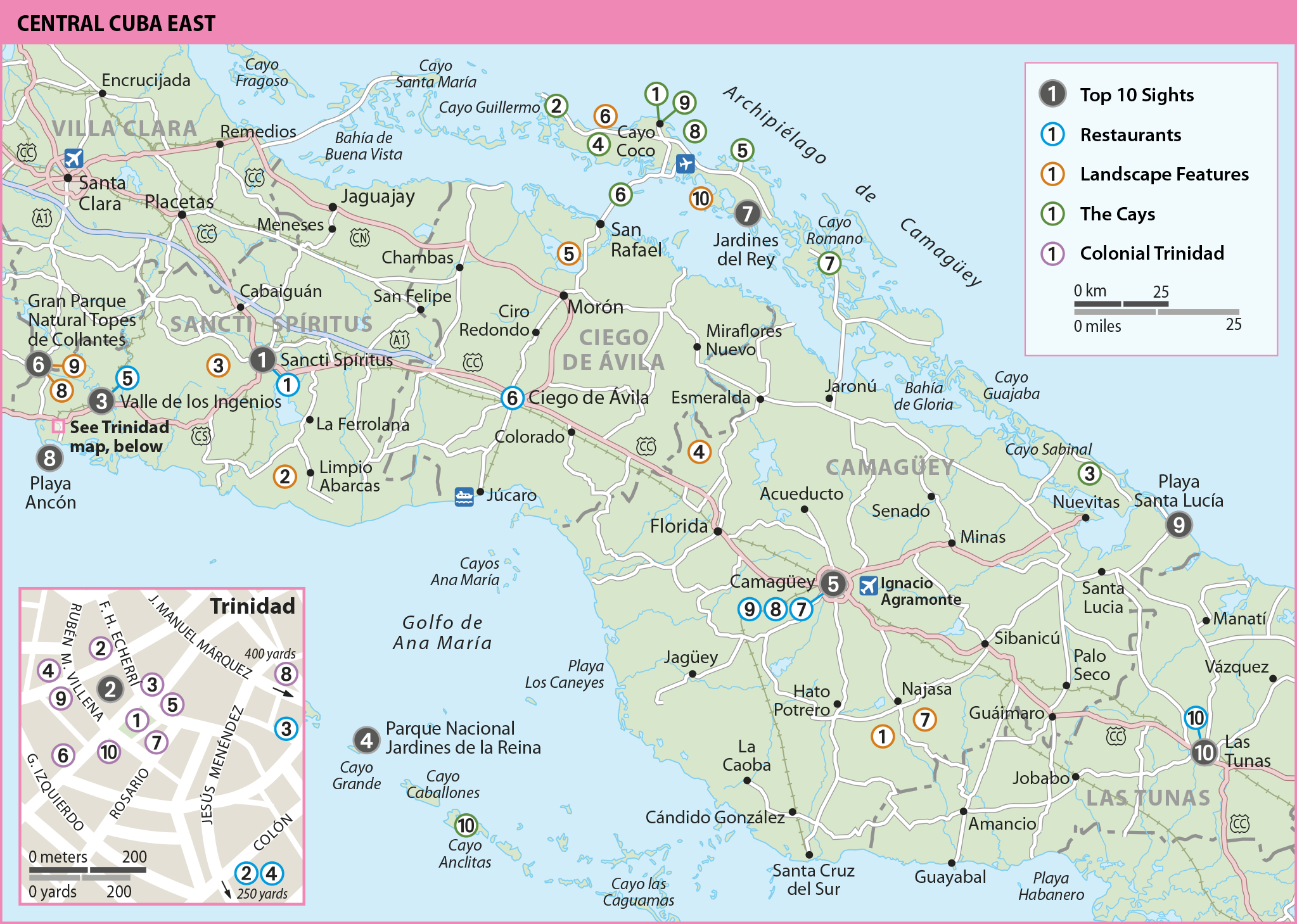
1.Sancti Spíritus
 Iglesia Parroquial Mayor del Espíritu Santo: Calle Agramonte Oeste 58 • 41 32 4855 • adm
Iglesia Parroquial Mayor del Espíritu Santo: Calle Agramonte Oeste 58 • 41 32 4855 • adm Founded in 1522, this city is often overlooked by visitors, who tend to focus on neighboring Trinidad. The historic core of Sancti Spíritus has elegant mansions and brightly colored colonial homes graced by wrought-iron lanterns and grills. Sights include the Yayabo bridge and Parque Serafín Sánchez. The highlight is Plaza Honorato, with its Casa de la Trova and the lovely Iglesia Parroquial Mayor del Espíritu Santo – a 17th-century church with a spectacular ceiling.
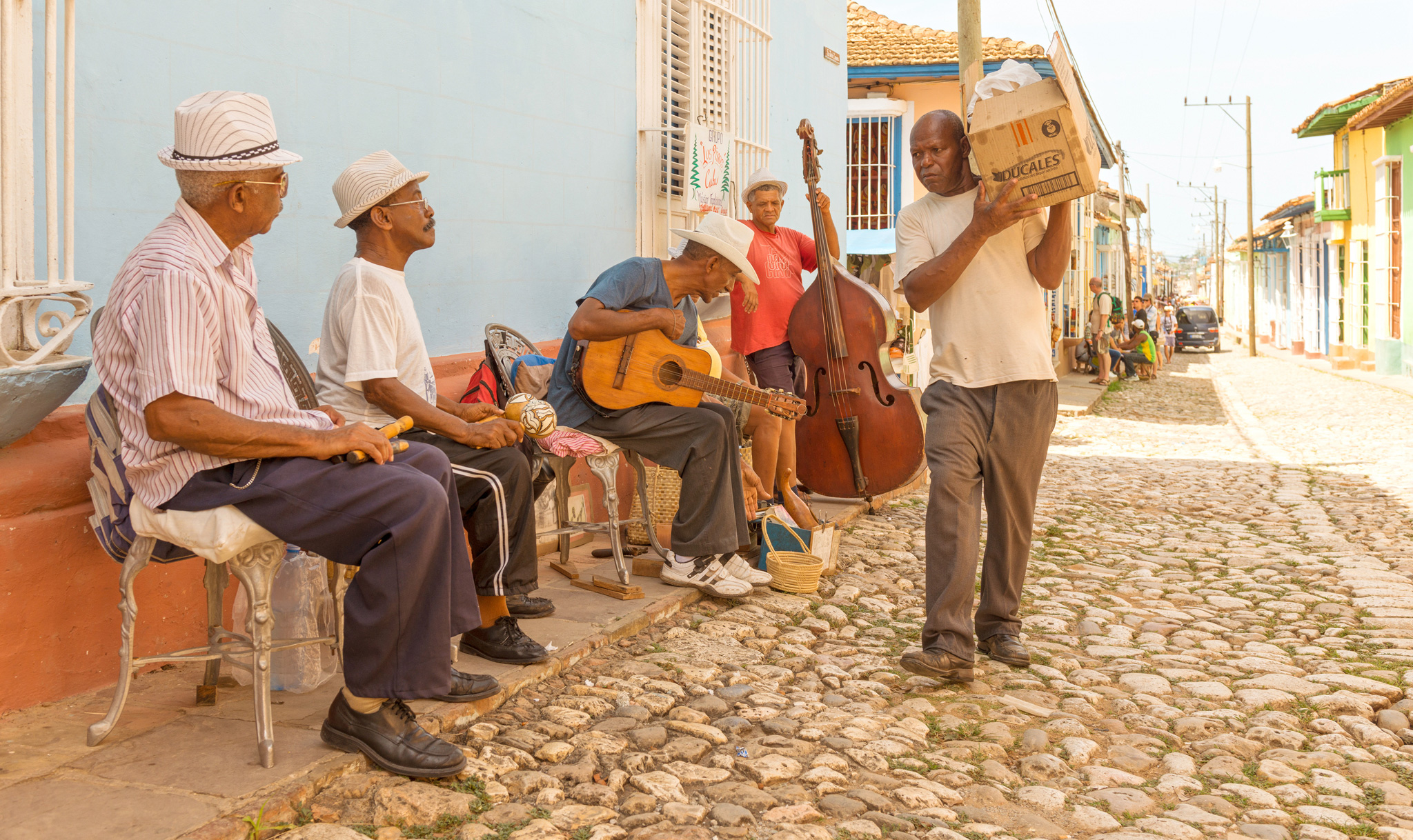
Musicians in Sancti Spíritus
2.Trinidad
Cuba’s most endearing colonial city was founded in 1514 by Diego Velázquez and named a UNESCO World Heritage Site in 1988. Closed to traffic, the cobbled streets have remained largely unchanged since the 18th century, when Trinidad grew wealthy from trade in slavery and sugar. The museums, churches, and plazas are intriguing, but the real joy is in wandering the narrow streets and observing daily life (for further details see Trinidad).

Iznaga Tower, Trinidad
3.Valle de los Ingenios
 Hacienda Manaca Iznaga: Iznaga • 41 99 7241 • adm
Hacienda Manaca Iznaga: Iznaga • 41 99 7241 • adm A broad carpet of sugarcane covers this fertile vale northeast of Trinidad. The area gets its name from the many ingenios (sugar mills) built during the 18th and 19th centuries, when vast sugar plantations occupied the entire valley. While many of the sugarcane estates are in the process of being restored as museums, the main house of the Hacienda Manaca Iznaga estate has been converted into a restaurant. Climb its 147-ft (45-m) tower for a great view of the valley.
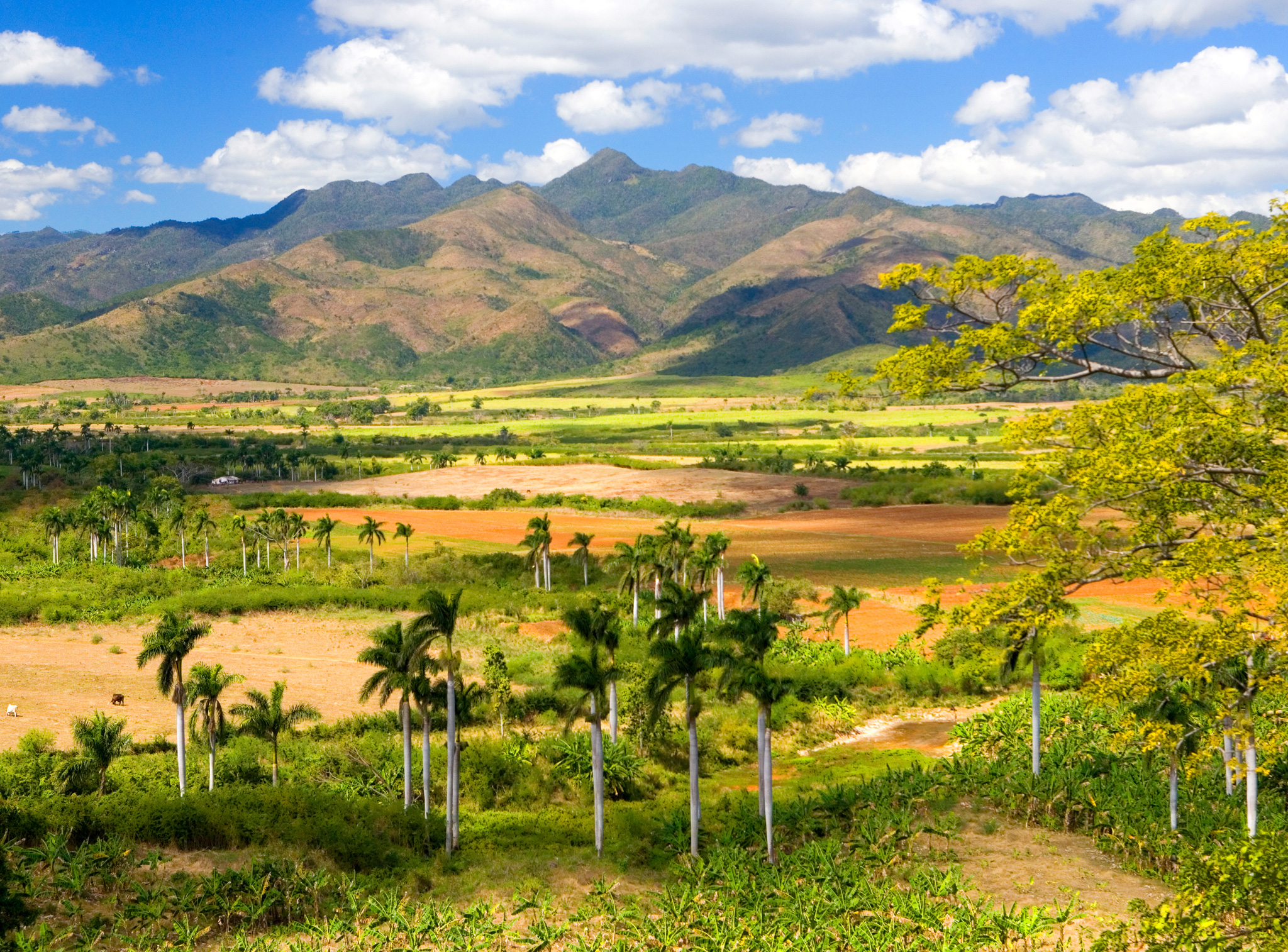
Valle de los Ingenios
4.Parque Nacional Jardines de la Reina
 Avalon Dive Center • www.cubandivingcenters.com
Avalon Dive Center • www.cubandivingcenters.com Over 600 deserted isles scattered off the Ciego de Ávila and Camagüey provinces form an oceanic Eden protected by a long coral reef. Marine turtles lay their eggs on beaches, while iguanas laze in the sun and flamingos wade in the shallows. Four cruise vessels and a floating hotel cater to anglers and divers. The Avalon Dive Center at Júcaro handles all visiting arrangements.
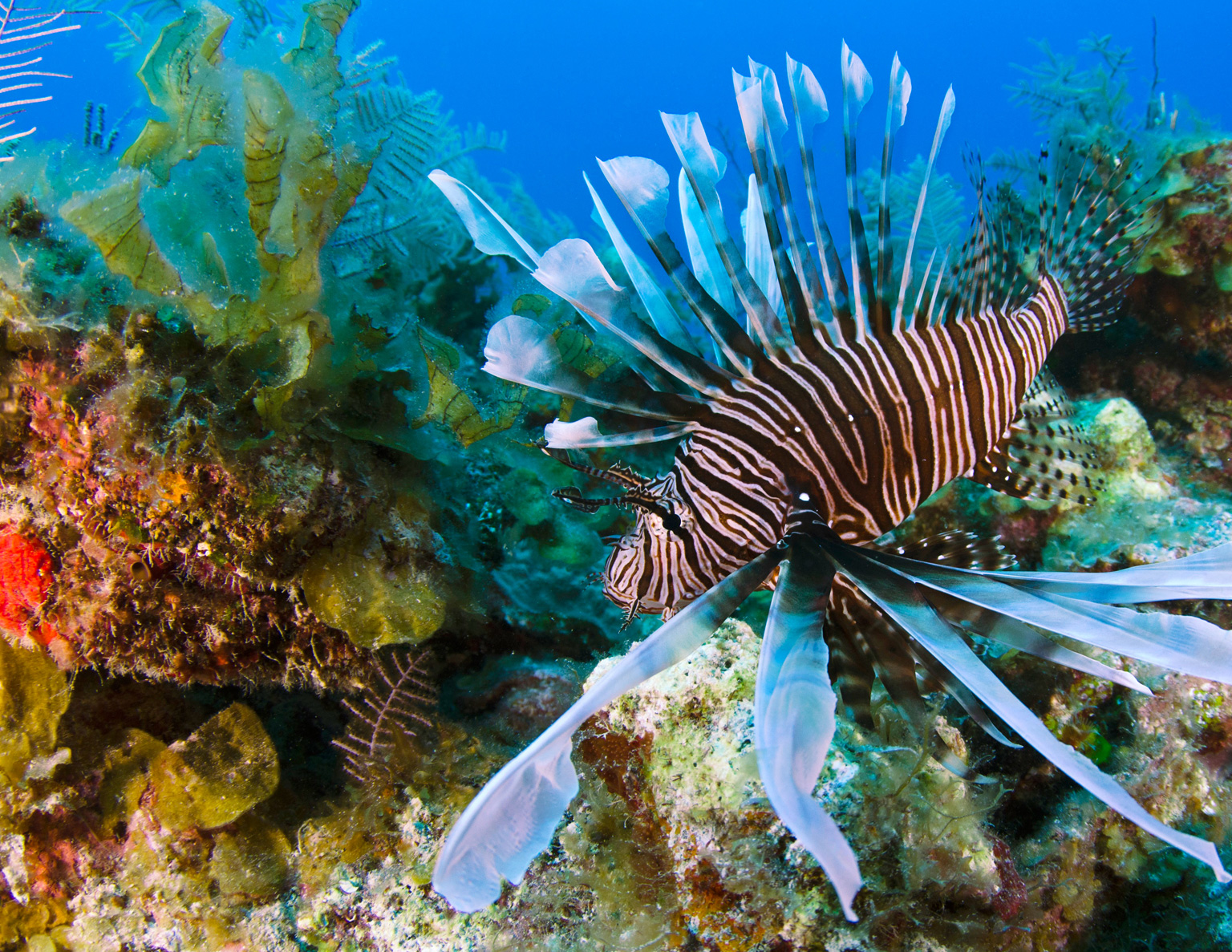
Parque Nacional Jardines de la Reina
5.Camagüey
The plazas of Cuba’s third-largest city are lined with colonial and Neo-Classical buildings. The city’s network of streets – designed to thwart pirates – can be confusing to visitors. Sites include the Catedral, museums, and the Teatro Principal – home to the Ballet de Camagüey. The best of the city’s nightlife can be experienced at the Casa de la Trova on Plaza Agramonte (for further details see Camagüey).

Camagüey’s colorful city center
6.Gran Parque Natural Topes de Collantes
 Gaviota Topes de Collantes • 42 54 0117 • Gaviota Trinidad • 41 99 6235
Gaviota Topes de Collantes • 42 54 0117 • Gaviota Trinidad • 41 99 6235 The steep drive to the northwest of Trinidad is well rewarded at Topes de Collantes, which functions as a base for hikes to the El Nicho waterfall and the colonial-era coffee estate at Finca Codina, where caves and a beautiful orchid garden can be explored. Topes has some hotels in its vicinity, plus a tourist information center, and the Gaviota, which oversees the complex, organizes tours and guides, including excursions from nearby Trinidad.
7.Jardines del Rey
Off the north coast of Ciego de Ávila and Camagüey, the Jardines del Rey (King’s Gardens) archipelago comprises about 400 islands, mostly uninhabited. Cayo Coco, one of the largest isles, and neighboring Cayo Guillermo have tourist hotels and watersports along their beaches. The diving is superb here, and flamingos flock to the inshore lagoons (for further details see Jardines del Rey).
8.Playa Ancón
The slender Península de Ancón south of Trinidad is lined by a fine, white-sand beach (for further details see Playa Ancón) served by three tourist hotels. With shallow waters good for swimming and snorkeling, it is also frequented by the locals. A dive center arranges trips to Cayo Blanco to view the fabulous black coral formations. A marina rents out sailboats to visitors prior to their arrival in Cuba.
9.Playa Santa Lucía
Proclaimed a beach-lovers’ paradise by the Cuban tourist board, this isolated resort has a lovely beach and fantastic opportunities for diving and seeing bull sharks being hand fed. Horse-drawn carriages visit nearby Playa Los Cocos, an even lovelier beach adjoining a ramshackle fishing village. Dining and entertainment are limited to the all-inclusive hotels.

Secluded Playa Santa Lucía
10.Las Tunas
 Museo Histórico Provincial: Calle Francisco Varona and Colón • 31 34 8201 • open 9am–5pm Tue–Sat, 8am–noon Sun • adm
Museo Histórico Provincial: Calle Francisco Varona and Colón • 31 34 8201 • open 9am–5pm Tue–Sat, 8am–noon Sun • adm Located between central and eastern Cuba, Las Tunas suffered during the Wars of Independence, when it was razed by fire. Carretera Central, the national highway, runs through the heart of the city, and is lined with charming houses. The main square features a museum of provincial history, and the local tradition of ceramic art thrives here.
LA TROCHA
A line of defence was built by the Spanish during the 19th-century Wars of Independence to block the advance of Cuban nationalist forces, the mambises. La Trocha stretched across Cuba from Morón, north of Ciego de Ávila, to Júcaro, on the Caribbean coast, and featured fortified towers.
A DAY IN CAMAGUEY
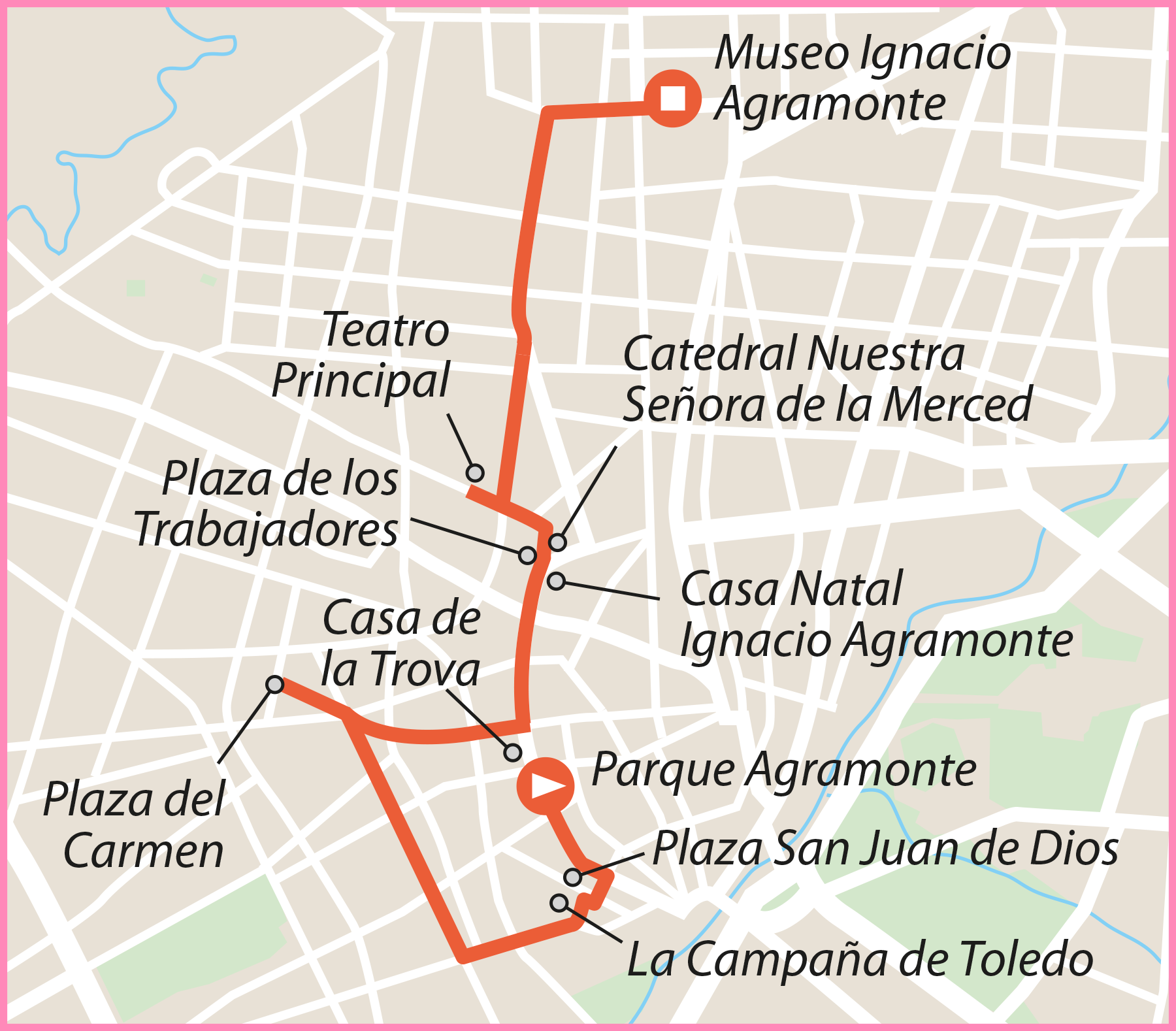
Morning
A day is barely enough to explore this historically significant town. Get an early start in the morning in Parque Agramonte to see the equestrian statue, the cathedral, and Casa de la Trova. Exit the square by following Calle Cisneros south. After two blocks, turn right. The street brings you to Plaza San Juan de Dios, surrounded by 18th-century houses. Explore the museum inside the Iglesia y Hospital San Juan de Dios, then follow Calle Matias west three blocks. Turn right onto Calle 24 de Febrero. After five blocks, cobbled Plaza del Carmen opens to the northwest at the junction with Calle Martí, and has life- like sculptures scattered about. Lunch on bolice mechado at La Campaña de Toledo.
Afternoon
Retrace your steps to Calle Martí and follow it east to Parque Agramonte. Turn left onto Calle Cisneros to reach Plaza de los Trabajadores. On your right, Casa Natal Ignacio Agramonte is worth a peek before exploring the Catedral Nuestra Señora de la Merced. Don’t miss its silver sepulchre. Exit the square to the northwest and walk one block to the Teatro Principal on your right. Then head north along Calle Enrique José to the Museo Ignacio Agramonte. Continue south along Calle República to return to the center.
Colonial Trinidad
1.Plaza Mayor
Trinidad’s main square is surrounded by 18th-century mansions. Two bronze greyhounds on the south side are popular with kids (for further details see Plaza Mayor).
2.Convento de San Francisco de Asís
 Calle Hernández Echerri 59 & Guinart • 41 99 4121 • Open 9am–5pm daily • Adm
Calle Hernández Echerri 59 & Guinart • 41 99 4121 • Open 9am–5pm daily • Adm Built in 1730 by Franciscan monks, this convent is currently home to the Museo de la Lucha Contra Bandidos.

Convento de San Francisco de Asís
3.Palacio Brunet
Boasting marble floors, decorative tilework, and fan windows, this mansion is now the Museo Romántico, which features period furniture.
4.Plazuela de Jigüe
This plaza was named after the jigüe (acacia) tree beneath which Father Bartolomé de las Casas celebrated the city’s first mass in 1514.
5.Iglesia Parroquial de la Santísima Trinidad
 Plaza Mayor
Plaza Mayor The Church of the Holy Trinity was built in 1892 on the site of the original parish church and has a Gothic altar.
6.Palacio Cantero
Home to the Museo Histórico, this gem is filled with sumptuous period furnishings and exhibits on Trinidad’s history (for further details see Museo Histórico).
7.Museo de Arquitectura Colonial
This exquisite museum has excellent displays showing the evolution of architectural styles specific to Trinidad (for further details see Museo de Arquitectura Colonial).
8.Iglesia de Santa Ana
 Calle Camilo Cienfuegos & Calle José Mendoza
Calle Camilo Cienfuegos & Calle José Mendoza At the northeast corner of the old city, this semi-derelict 18th-century church stands over a small plaza. There’s also a lively cultural center located in a former prison.
9.Casa Templo de Santería Yemayá
 Rubén Martínez Villena 59
Rubén Martínez Villena 59 Learn about the lores of Santería, the syncretic Afro-Cuban religion, at Casa Templo. This colonial home of a practitioner has an altar dedicated to Yemayá, the Virgin of Regla.
10.Casa de Don Rafael Ortíz
 Calle Rubén Martínez Villena & Calle Bolívar • 41 99 4432 • Open 8am–5pm Tue–Sat, 8am–1pm Sun–Mon
Calle Rubén Martínez Villena & Calle Bolívar • 41 99 4432 • Open 8am–5pm Tue–Sat, 8am–1pm Sun–Mon This early 19th-century mansion has an art gallery and a balcony with wonderful views of the plaza.

Painting at Casa de Don Rafael Ortíz
The Cays
1.Diving with Sharks
Certified divers can experience thrilling encounters with sharks on organized dives at Cayo Coco and Playa Santa Lucía. Whale sharks can be seen at Jardines de la Reina.
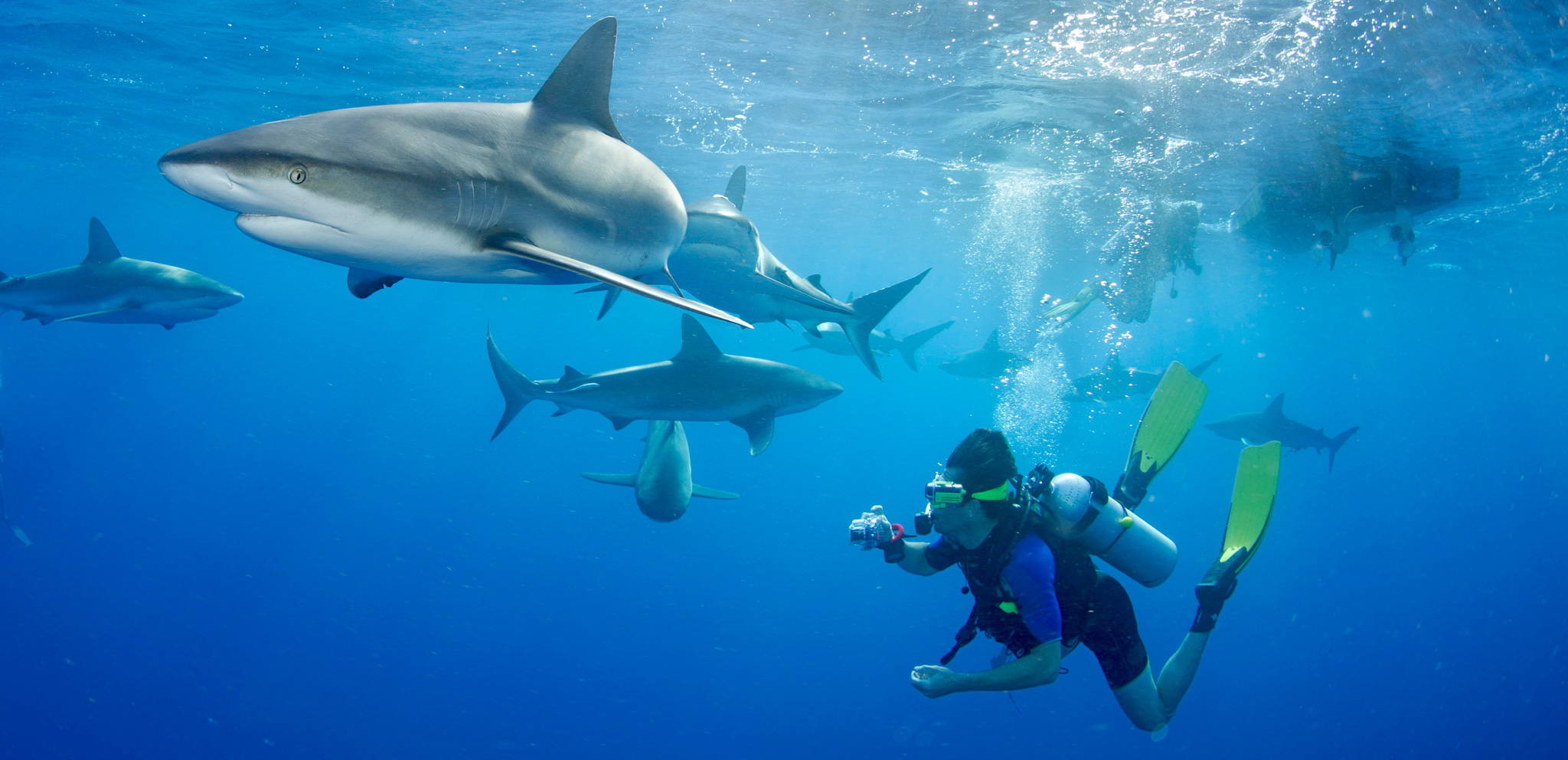
Scuba diver filming sharks
2.Cayo Guillermo
Linked to Cayo Coco by a narrow causeway, this small cay is blessed with stunning beaches and warm waters. Its bountiful mangroves provide good opportunities for those interested in bird-watching (for further details see Cayo Guillermo).
3.Cayo Sabinal
A remote cay that is accessible solely by a rough dirt road or by boat excursions from Playa Santa Lucía, Cayo Sabinal has three spectacular beaches, but facilities are scarce. Wild pigs roam the scrub-covered interior (for further details see Cayo Sabinal).
4.Cayo Coco
More than 14 miles (23 km) of gorgeous white beaches, crystal-clear turquoise ocean, and excellent all-inclusive hotels draw visitors from far and wide to Cayo Coco.
5.Cayo Paredón Grande
This scrub-covered cay offers a beach with a superb bar. Water sports can also be arranged through your hotel. Built in 1859, the intriguing Faro Diego Velázquez lighthouse, is located here.
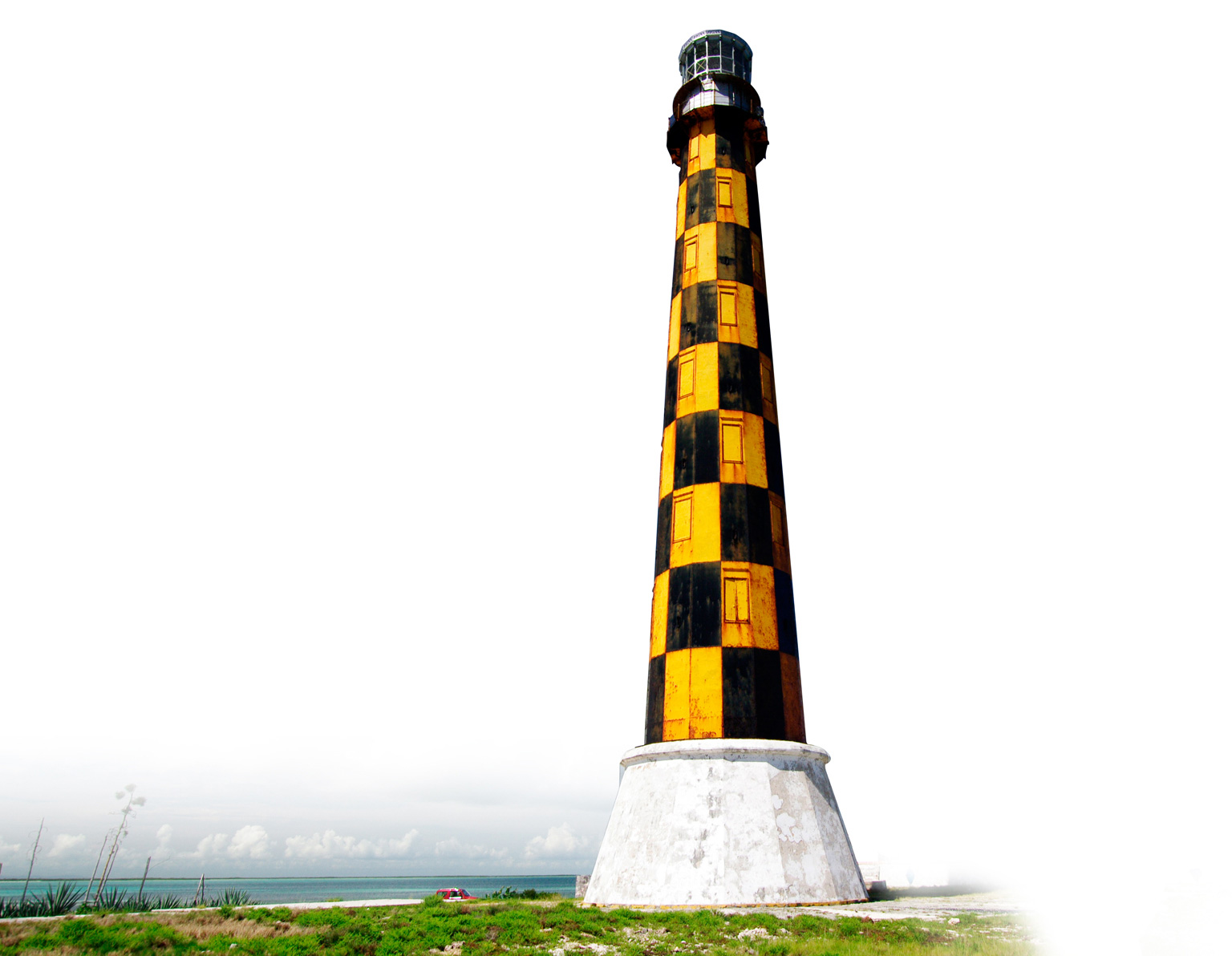
Faro Diego Velázquez lighthouse
6.Pedraplén
This causeway connects Cayo Coco to the mainland. Made of solid earth with only two sluices, it bisects the existing bay and has an impeded tidal flow (for further details see Pedraplén).
7.Cayo Romano
Spectacular coral reefs await visitors to this large uninhabited cay. A road connects to the mainland at Brasil, where a military checkpoint sometimes denies access.
8.Fishing
Enthusiasts of fishing can follow the example of Ernest Hemingway who trawled the clear waters off the Jardines del Rey for marlin and other game-fish. Sport-fishing trips are offered from the main beach resorts and by Avalon Dive Center.
9.Centro de Investigaciones de Ecosistemas Costeros
 Cayo Coco • 33 30 1161
Cayo Coco • 33 30 1161 This center for coastal environmental studies and protection is open to the public and features exhibits on manatees, flamingos, and coral reefs.
10.Cayo Anclitas
In the heart of the Jardines de la Reina, this tiny cay has a turtle farm and a visitors’ center. A floating hotel offshore plays host to diving and fishing excursions.
Landscape Features
1.Mogotes
These dramatic limestone forms (for further details see Mogotes) add beauty to the pleasure of hiking in the Área Protegida de Recursos Manejados Sierra del Chorrillo, southeast of Camagüey.
2.Sugarcane Fields
The southern half of the Sancti Spíritus province is a veritable sea of sugarcane, extending east into much of Ciego de Ávila province. Feathery fronds rise from the stalks during the dry summer months.
3.Rugged Mountains
 La Sabina: Carretera Cacahual • 41 55 4930 • ecoturss@enet.cu
La Sabina: Carretera Cacahual • 41 55 4930 • ecoturss@enet.cu The craggy, thickly forested Alturas de Banao formed a base for Che Guevara’s guerrilla army in 1958. Trails lead out from La Sabina, an ecological study camp offering accommodation in rooms and tents.
4.Plains
Hardy cattle munch the windswept, grassy savannah plains of the eastern Ciego de Ávila and Camagüey provinces, where the vaquero (cowboy) lifestyle is still very much alive.
5.Lakes
 Morón
Morón Anglers delight in the many fish species near Sancti Spíritus, and in the milky-colored Laguna de la Leche and Lago de Redonda, both outside Morón.
6.Beaches
Sandy beaches unfurl along the Atlantic shore of the Jardines del Rey. The cays of the Jardines de la Reina are also ringed by white sands. The mainland shore has few beaches (for further details see Beach Resorts).
7.Tropical Forest
Dense montane forests cloak much of this region. Sierra del Chorrillo, south of Camagüey, is an excellent venue for those who want to explore the tropical dry forests.
8.Underground Caves
Caves make up a large part of the limestone uplands around Topes de Collantes. The Cueva del Jabalí at Cayo Coco features a restaurant and cabaret.
9.Waterfalls
Drenched in rainfall, the Sierra del Escambray around Topes de Collantes resounds to the thunderous noise of cascades splashing into crystal-clear pools. The Salto de Caburní is easily reached by a well-trodden trail.
10.Coral Cays
Enhanced by their setting in seas of jade and aquamarine, coral cays speckle the oceans off Central Cuba East. Most are uninhabited but offer excellent wildlife viewing.
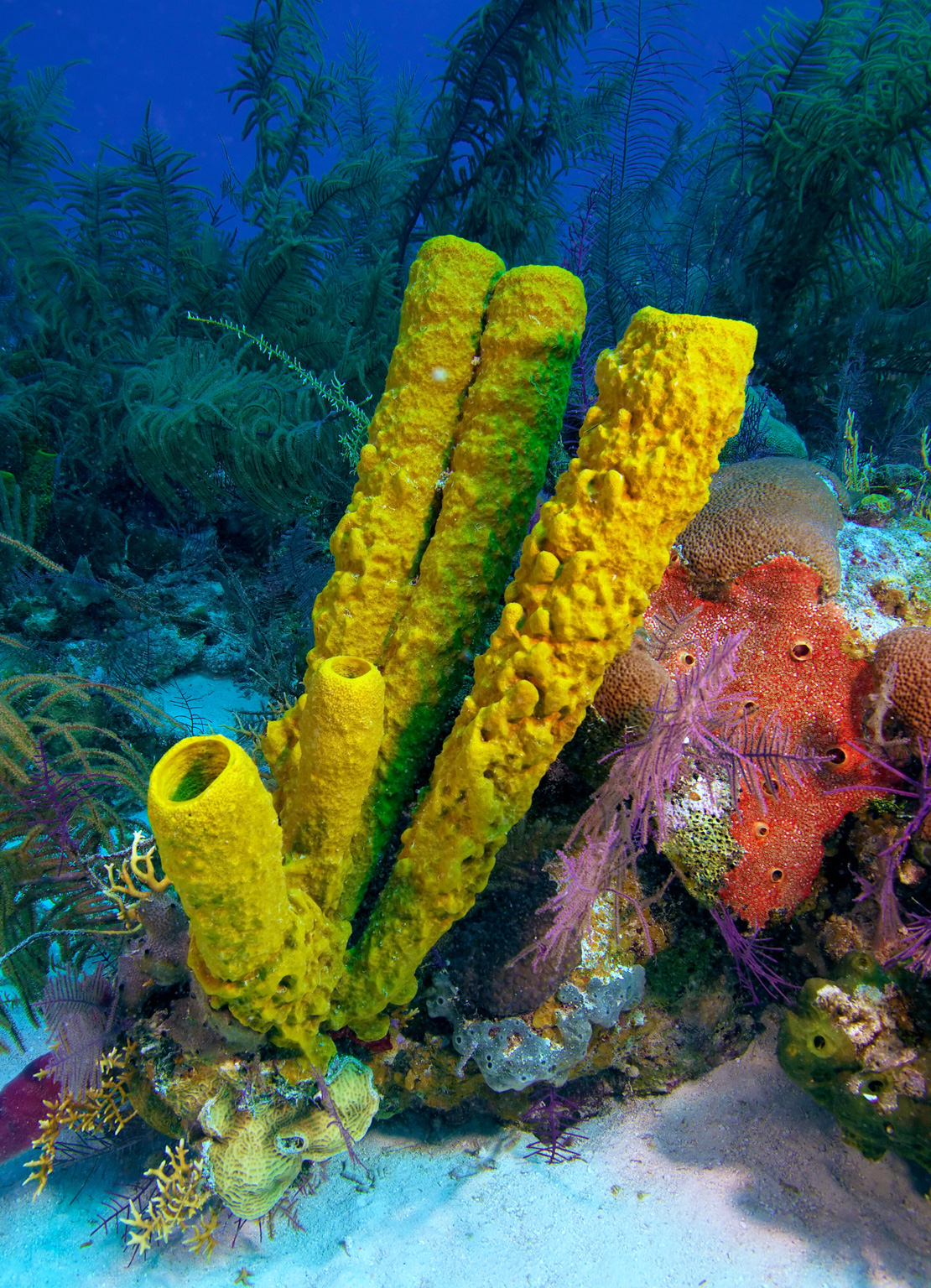
Coral reef near Cayo Largo
Restaurants
1.Mesón de la Plaza
 Calle Máximo Gómez 34, Sancti Spíritus • 41 32 8546 • $$
Calle Máximo Gómez 34, Sancti Spíritus • 41 32 8546 • $$ Re-creating the rustic ambience of a Spanish bodega with cowhide chairs and benches, this restaurant serves bargain-priced dishes.
2.Gourmet Restaurant
 Calle José Martí 262, Trinidad • 41 99 6073 • $$$
Calle José Martí 262, Trinidad • 41 99 6073 • $$$ A plush option within the Iberostar Gran Hotel Trinidad. International dishes are prepared with aplomb.
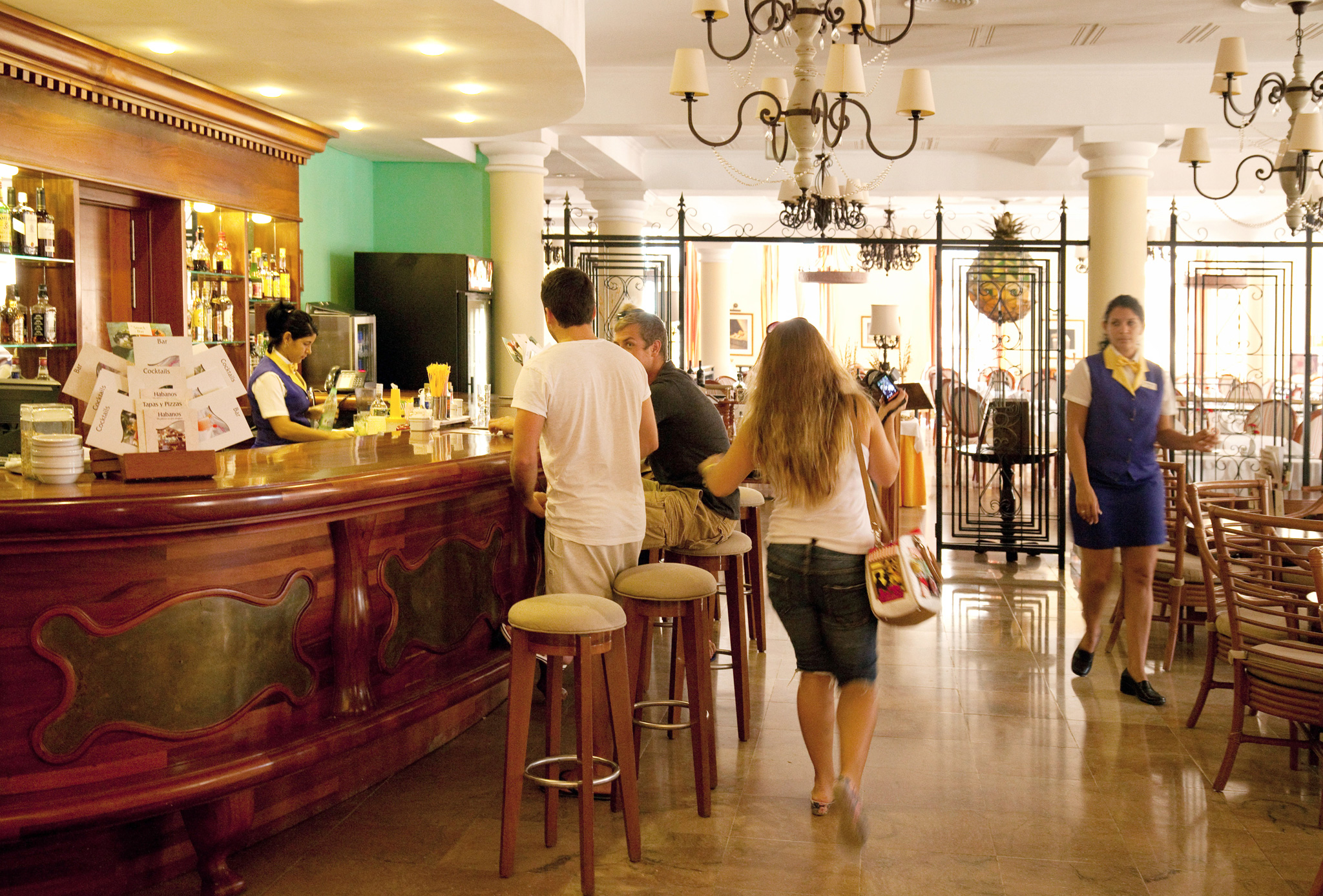
Gourmet Restaurant
3.Vista Gourmet
 Callejón Galdos, Trinidad • 41 99 6700 • Open noon–midnight daily • $$
Callejón Galdos, Trinidad • 41 99 6700 • Open noon–midnight daily • $$ At this attractive paladar, you can enjoy a spectacular dinner buffet on a rooftop terrace.
4.Guitarra Mía
 Calle Jesus Menéndez 19 between Cienfuegos & Pérez, Trinidad • 41 99 3452 • $$
Calle Jesus Menéndez 19 between Cienfuegos & Pérez, Trinidad • 41 99 3452 • $$ This homely restaurant serves delicious criollo dishes to the accompaniment of live music. The owner is a famous guitarist.
5.Restaurante Manacas Iznaga
 Iznaga, Valle de los Ingenios • 41 99 7241 • $$
Iznaga, Valle de los Ingenios • 41 99 7241 • $$ This former sugar-estate owner’s mansion provides a unique setting for enjoying traditional Cuban dishes.
6.Fonda Cubana
 Calle Máximo Gómez, Ciego de Ávila • 33 20 0000 • Open noon–10pm daily • $
Calle Máximo Gómez, Ciego de Ávila • 33 20 0000 • Open noon–10pm daily • $ Dine on fried chicken, paella, or ropa vieja (shredded beef with vegetables) on the colonnaded patio of this lovely colonial building. The fixed-price set menu is also a bargain.
7.Restaurante 1800
 Plaza San Juan de Dios, Camagüey • 32 28 3619 • $$
Plaza San Juan de Dios, Camagüey • 32 28 3619 • $$ This elegant private restaurant offers period furnishings, a great location, and an excellent buffet (menu options are also available ). There are tables on the attractive square outside.
8.Grand Hotel
 Calle Maceo 64, Camagüey • 32 29 2093 • $$
Calle Maceo 64, Camagüey • 32 29 2093 • $$ Of the Grand Hotel’s two choices of eatery, the rooftop restaurant is preferred for its quality buffet dinner. The fine views over the city center are a definite bonus.
9.La Campaña de Toledo
 Plaza San Juan de Dios, Camagüey • 32 28 6812 • $$
Plaza San Juan de Dios, Camagüey • 32 28 6812 • $$ Located in the center of Camagüey, opposite one of the most emblematic plazas in the town, this restaurant's signature dish is bolice mechado, a local beef delicacy.
10.Caballo Blanco
 Calle Frank País 85, Las Tunas • 31 34 2586 • Open 11am–11pm daily • $
Calle Frank País 85, Las Tunas • 31 34 2586 • Open 11am–11pm daily • $ One of the finest private restaurants, this paladar features a stone-clad patio for dining. Try the delicious chicken with wine and the ropa vieja.


